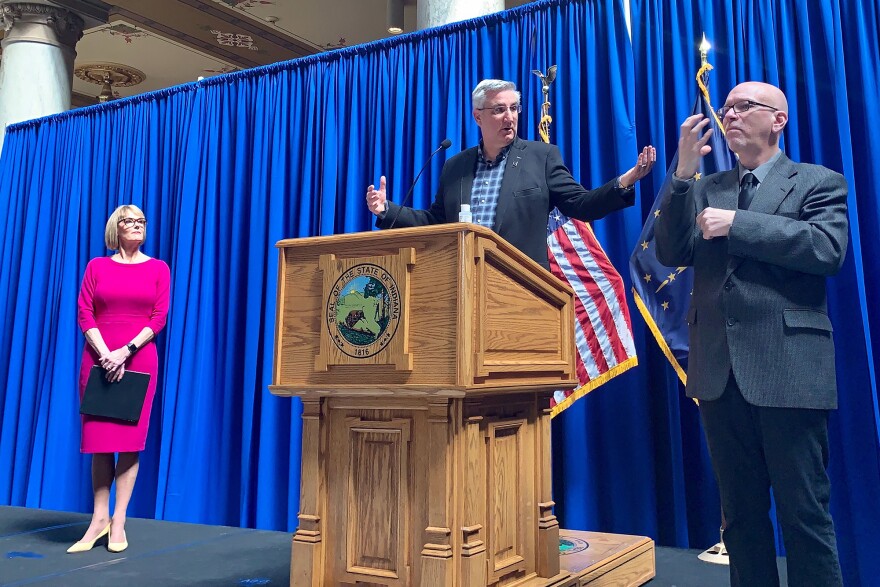Updated 3/26/2020 5:09 pm
Ventilators are among the most important equipment hospitals need to treat a surge of COVID-19 patients. Companies such as General Motors are gearing up emergency production of the machines, which take over the labor of breathing for a patient with a serious case of the virus.
As many as 742,500 U.S. residents could need ventilators in a severe outbreak similar to the 1918 flu, according to a 2005 Health and Human Services report. U.S. health care facilities only have an estimated 160,000 ventilators -- many of which are already being used -- and the Strategic National Stockpile has 16,600 more, according to the Center for Public Integrity.
Anticipating a shortage, leaders in some states have been vocal about how many ventilators they have, how many they need and how many they have requested from the federal government’s Strategic National Stockpile.
Illinois Gov. J.B. Pritzker has said that the state will need about 5,000 ventilators. Health officials estimate the state has about 2,200 currently. “The federal government isn't providing most of that to the states. We're out there competing against each other," he said.
New York Gov. Andrew Cuomo said the state needs 30,000 ventilators to handle the projected surge of COVID-19 cases. The Trump administration has said it will send 4,000. “Where are they? Where are the ventilators?” asked Cuomo.
Iowa Gov. Kim Reynolds also has offered statistics about her state’s preparedness. “We have approximately 280 [ventilators] right now,” she said recently.
But so far, Indiana has not released information on its ventilator supply.
At a news conference Wednesday, State Health Commissioner Dr. Kristina Box declined to tell Indiana Public Broadcasting how many ventilators the state has. “But I can tell you that I’m seeing some very positive movements in that,” she said, mentioning that hospitals are in the process of gathering older ventilators that have not been in use.
Box declined to give the number of ICU beds available in the state, as well. On Thursday, she again refused to provide numbers. "I will never share hard numbers with you," she said.
Brian Houston, director of the Disaster and Community Crisis Center at the University of Missouri, says a lack of information from state officials can be problematic.
“Not providing the information makes the situation worse. We see it time and time again in terms of disaster and crisis response,” Houston says.
A lack of information can make people worry that the state doesn’t have enough resources to address a crisis, he says, or it could do the opposite: People may take the crisis less seriously than they should.
“We are left as citizens are left to our own devices to conclude whatever we want to conclude,” he says.
The Marion County Health Department, the local health department responsible for Indianapolis, also declined to give specific numbers, and suggested Side Effects reach out to the local hospital systems.
But hospitals have been tight-lipped, too. None of the five major health systems in Marion Co. -- Indiana University Health, Ascension St. Vincent, Franciscan Health, Eskenazi Health and Community Health Network -- responded to email inquiries about ventilator numbers.
Asked about ventilators, Health Services Director Cara Christ says Arizona has about 1,000
— Andrew Oxford (@andrewboxford) March 25, 2020
The goal is to have 4,500, she says
The state also declined to disclose what it had received from the Strategic National Stockpile, or what it had requested. “More specific information on the supplies is not available at this time as we are focused on working with hospitals to meet their needs and get resources to those who need them efficiently,” an email from the state’s Joint Information Center said.
A 2010 survey estimated that Indiana had fewer than 1,500 full-feature ventilators.
At the news conference Wednesday, Box indicated one of the reasons she would not give specific numbers was that "hospitals and companies" gathering that information expect the data to remain confidential.
Indiana Public Broadcasting's Brandon Smith contributed reporting to this story.
Correction: An earlier version of this story misinterpreted a comment from Box about data-sharing arrangements. The story has been updated to clarify her statement that "hospitals and companies" gathering data expect it to remain confidential.
This story was produced by Side Effects Public Media, a news collaborative covering public health.






